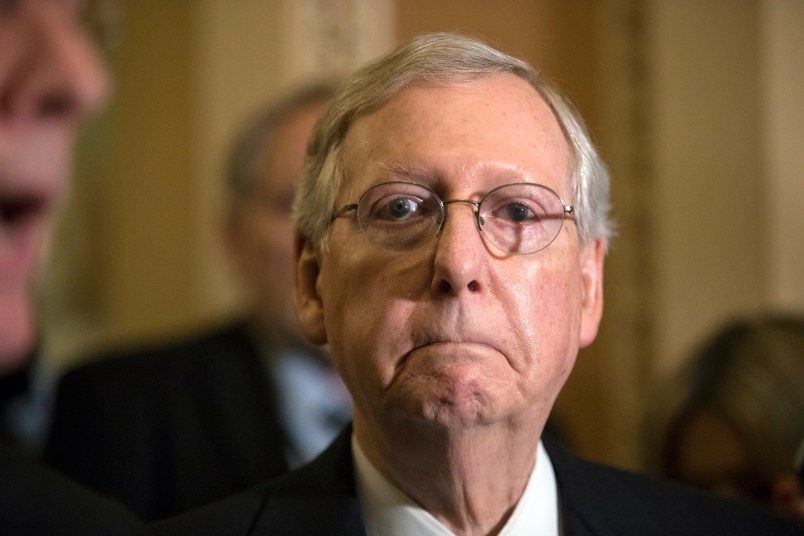Tierney Sneed contributed reporting.
Senate Republicans emerged grim-faced and tight-lipped from a closed-door lunch meeting Tuesday with the news that they were delaying a vote on their bill to repeal the Affordable Care Act until after the July 4 recess.
The decision came as more senators from both the hard-right and centrist wings of the caucus announced their intent to vote no on a procedural hurdle, effectively stopping the bill dead in its tracks. Some of these defections were fueled by a brutal Congressional Budget Office analysis that showed the bill would cause 22 million people to lose their health insurance over the next decade.
Some lawmakers attempted to put a positive spin on the news of the vote delay, insisting to reporters that they merely needed to make final tweaks before achieving a consensus.
“We are so close,” said Sen. David Perdue (R-GA). “We just need a few more days to get these differences ironed out. I’m hopeful.”
But other Republicans acknowledged that deep ideological divides remain, and that any changes to the bill made to win the votes of hardline conservatives like Sens. Mike Lee (R-UT) and Rand Paul (R-KY) would invariably lose those from Sens. Susan Collins (R-ME) and Lisa Murkowski (R-AK).
“There seems to be a real philosophical divide,” Sen. Lindsey Graham (R-SC) mused to reporters. “Some people think the Medicaid growth rates are not generous enough. You have people who believe there is too much Obamacare left. I don’t know how you bridge that gap.”
The opposing factions have so far received little help from President Trump, who summoned all Republican Senators to the White House Tuesday afternoon not to argue for the merits of the bill or propose specific changes, but to announce: “If we don’t get it done, it’s just going to be something that we’re not going to like and that’s OK.”

From Sen. Richard Shelby (R-AL), who told TPM he’s a “straight-out repeal guy,” to Sen. Steve Daines (R-MT), who insisted to reporters that any bill must “lower premiums, cover pre-existing conditions, and insure that we protect Medicaid,” to Collins who demanded the restoration of the funding the bill currently cuts from Planned Parenthood, Republicans were all over the map on what they wanted their final health care bill to look like.
Collins—a holdout on the bill—said she has so many concerns about provisions on Medicaid, Planned Parenthood funding and support for rural hospitals that she doubts any changes at this point could win her over.
“It’s difficult for me to see how any tinkering is going to satisfy my fundamental and deep concerns about the impact of the bill,” she said. Earlier on Tuesday, she told reporters she believes the Senate needs to “go back to the drawing board and work in a bipartisan fashion.”
Sen. Dean Heller (R-NV), who faces a tough reelection fight next year, laid out a series of changes needed to win his vote that have essentially no chance of adoption, particularly the protection of the Medicaid expansion. He admitted in a tele-town hall Tuesday night that while senators are “coming up with some ideas,” they are not “anywhere close” to agreement.
In another ominous sign for the bill’s prospects, Sen. Jerry Moran (R-KS), usually a reliable vote for leadership, announced Tuesday that he, too, opposed the bill as-is.
Full statement on Senate healthcare legislation: pic.twitter.com/R9XFCa5p1F
— Jerry Moran (@JerryMoran) June 27, 2017
But even as Majority Leader Mitch McConnell struggles to muster enough Republican votes to get the bill over the finish line, senators waved away questions of whether they would attempt to reach across the aisle. Asked if there were any talks of bring Democrats into the negotiations, Sen. Bob Corker (R-TN) told reporters: “I don’t think that’s a reality. I’m just being honest.”
McConnell reportedly used the prospect of having to work with Democrats—on not just health care but all issues—as a threat this week to pressure Republicans to fall in line, but it was not enough to muster the votes by Thursday as originally planned.
Because the divisions are so deep, and go right to the heart of questions about the government’s role in caring for its citizens, it is much more likely one side of the Republican caucus will cave than both sides will reach a compromise.
We could also see a repeat of what happened as the health care bill foundered in the House of Representatives just a few weeks ago: the bill was amended to allow states to waive even more protections and regulations in their insurance markets, a few billion dollars was thrown at the individual market, and several moderates fell in line after being promised side deals on unrelated issues.











After 8 years all they have are epic FAILS and no one to blame but themselves.
Sucks to be them.
That sad McConnell face is one I can bear looking at. In fact I wouldn’t mind seeing more of it.
Pence may have to cast the deciding vote, but I’m still convinced that this bill will eventually pass. They’ll find a way to strike a deal with enough of these holdouts the same way they did in the House. Republican leadership will stop at nothing to get these tax cuts done.
In the end the only solution will be for the USA to join most civilized nations and introduce a single payer healthcare system.
McConnell will round up just enough votes to destroy Healthcare. What we need to discuss is how America ended up with a ruling party that truly hates America and Americans.